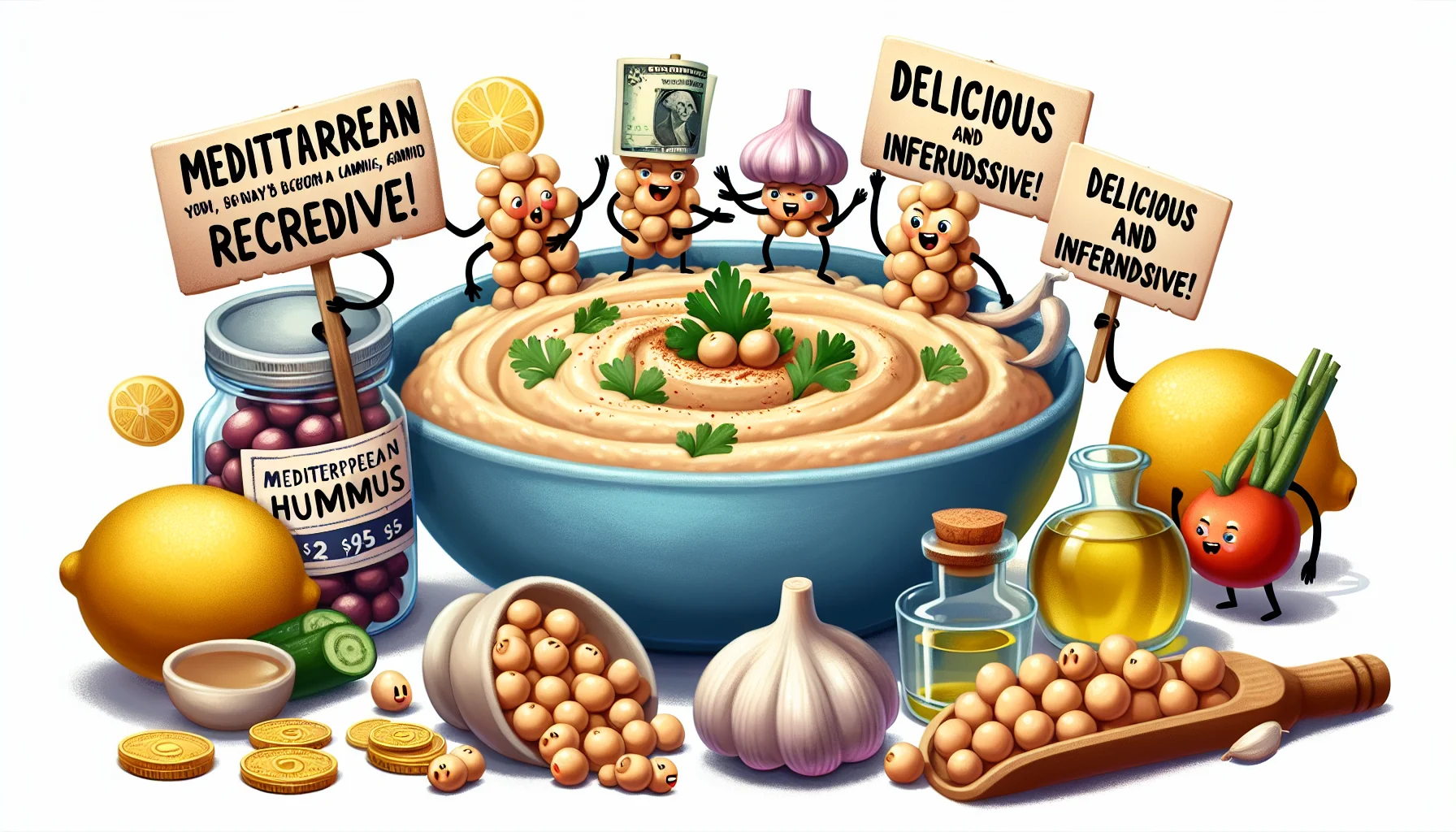Mediterranean hummus recipe Quiz
Test Your Knowledge
Question of
Mediterranean Hummus Recipe: A Staple of Healthy Eating
Hummus is not just a delicious dip or spread; it's a cornerstone of Mediterranean cuisine, revered not only for its taste but also for its numerous health benefits. Originating from the Middle East, this creamy blend of chickpeas, tahini, olive oil, lemon juice, and garlic has crossed borders to become a global favorite. Rich in protein, fiber, and healthy fats, hummus supports heart health, aids in weight management, and provides essential nutrients including iron, folate, phosphorus, and B vitamins. Its versatility and nutritional profile make hummus an indispensable part of a balanced diet, embodying the essence of Mediterranean eating by prioritizing plant-based ingredients, wholesomeness, and flavor.
Ingredients for Authentic Mediterranean Hummus
- 1 can (15 oz) chickpeas, drained and rinsed
- 1/4 cup fresh lemon juice (about 1 large lemon)
- 1/4 cup well-stirred tahini
- 1 small garlic clove, minced
- 2 tablespoons extra-virgin olive oil, plus more for serving
- 1/2 teaspoon ground cumin
- Salt to taste
- 2 to 3 tablespoons water
- Dash of ground paprika, for serving
- Chopped fresh parsley, for garnish
Step-by-Step Guide to Making Mediterranean Hummus
- Rinse and drain 1 can of chickpeas.
- Peel and mince 2 cloves of garlic.
- In a food processor, combine the chickpeas, minced garlic, 2 tablespoons of tahini, juice of 1 lemon, 2 tablespoons of olive oil, and a pinch of salt.
- Blend until smooth. If the mixture is too thick, add 1-2 tablespoons of water to reach the desired consistency.
- Taste and adjust the seasoning, adding more salt, lemon juice, or tahini as needed.
- Transfer the hummus to a serving bowl and create a shallow well in the center.
- Drizzle additional olive oil over the top and sprinkle with paprika.
- Garnish with chopped parsley and serve with warm pita bread or fresh vegetables for dipping.
Nutritional Benefits of Mediterranean Hummus
Mediterranean hummus is not only a delicious spread or dip that complements a variety of dishes but also a powerhouse of nutrition, thanks to its wholesome ingredients. The primary ingredient, chickpeas, is a great source of plant-based protein and dietary fiber, which can aid in digestion and help maintain a healthy weight. Tahini, made from sesame seeds, is rich in healthy fats, vitamins, and minerals, particularly calcium and magnesium, which are essential for bone health. Olive oil, another key component, is loaded with antioxidants and monounsaturated fats, contributing to heart health by lowering bad cholesterol levels. Lemon juice adds a dose of vitamin C, enhancing iron absorption from the chickpeas and supporting the immune system. Together, these ingredients make Mediterranean hummus a nutritious choice for a healthy diet.
Serving Suggestions for Mediterranean Hummus
Hummus, a creamy and savory delight from the Mediterranean, is incredibly versatile and can be enjoyed in numerous ways. A classic approach is to serve it as a dip with warm, fluffy pita bread or crisp, fresh vegetables such as carrots, cucumbers, and bell peppers. It also makes for a flavorful spread on sandwiches or wraps, adding a rich, creamy texture. For a more creative twist, hummus can be used as a base for a Mediterranean-inspired pizza, topped with olives, feta, and sun-dried tomatoes. Another delightful option is to incorporate it into salads, either as a dressing or a hearty topping. No matter how you choose to enjoy it, hummus brings a taste of the Mediterranean to any dish.
Variations of the Classic Mediterranean Hummus Recipe
- Roasted Red Pepper Hummus - Adding roasted red peppers blends a sweet and smoky flavor.
- Beet Hummus - Incorporating roasted or boiled beets offers a vibrant color and earthy taste.
- Avocado Hummus - Mix in ripe avocados for a creamy texture and a boost of healthy fats.
- Spicy Hummus - Spice it up with jalapenos, cayenne pepper, or hot sauce for those who like it hot.
- Black Bean Hummus - Substitute chickpeas with black beans for a different take on the classic.
- Pumpkin Hummus - Adding pumpkin puree and spices like cinnamon and nutmeg for a fall flavor.
- Chocolate Dessert Hummus - For a sweet twist, blend in cocoa powder and sweeteners into the basic recipe.
- Zucchini Hummus - Great for those avoiding legumes, using raw zucchini instead of chickpeas.
- Sun-Dried Tomato Hummus - Sun-dried tomatoes add a tangy and rich flavor profile.
- Lemon Artichoke Hummus - Incorporate artichoke hearts and extra lemon for a zesty and refreshing version.
Storing and Preserving Your Hummus
To ensure your homemade hummus stays fresh and delicious, proper storage is key. Firstly, always store hummus in an airtight container to keep it from drying out or absorbing odors from the fridge. For best results, smooth the top of the hummus flat before sealing the container, and consider drizzling a thin layer of olive oil over the surface. This can act as a sealant, reducing air exposure. Refrigerate your hummus promptly, and it should last for up to a week. If you need to store it for a longer period, hummus can be frozen for up to four months. To freeze, divide it into portions you'll use at one time, and thaw in the refrigerator overnight before serving. Remember, fresh ingredients and proper storage are the secrets to extending the enjoyment of your homemade hummus.












